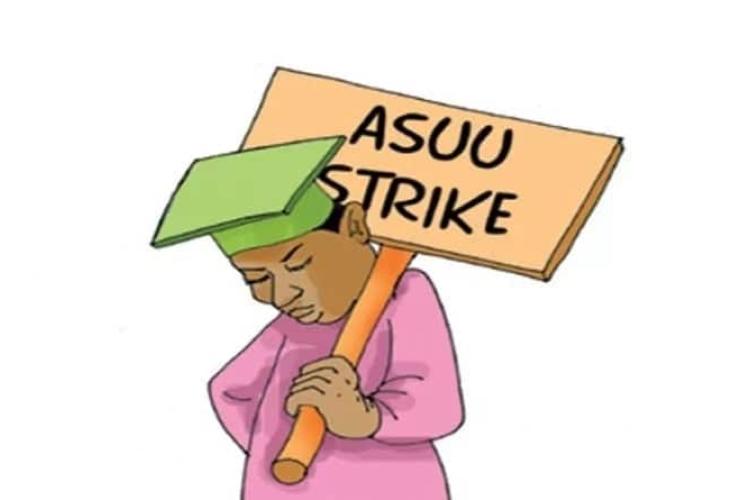Rasheedat Shuaib
Nothing can be more shocking than learning that the Academic Staff Union of Universities (ASUU) had embarked on no less than 16 industrial actions between 1999 and 2022.
For those who may not know, a major factor triggering our university lecturers to be laying down their tools intermittently is the failure of the government to fulfill an agreement it once entered with the academic union.
Maikyau sworn in as 31st NBA president
The story of my water-powered cooking stove – Gombe self-taught ‘engineer’
Another factor is the failure of the lecturers to reinvent themselves and face current realities by finding fresh ways of resolving their incessant disputes with the government.
Each time the ASUU strike rears its ugly head, one is forced to conclude that both the government and our lecturers lack empathy for us the students. Better put, they don’t have our interests at heart.
The recurrence of ASUU strikes has numerous negative impacts on us; something the government and ASUU don’t consider when they fail to come to an agreement. We lost a whole session to this same madness two years ago. The same thing is already happening now, with the ongoing strike.
Since an idle mind, as they say, is the devil’s workshop, it goes without saying that idle students, forced to remain at home by the ongoing ASUU strike can be instigated to join criminal activities such as cybercrime, kidnapping, armed robbery and the likes of it.
It is however good to note that during ASUU strikes, some students devote their time to learning relevant vocational skills. And learning a skill is crucial especially now that there is no hope of securing a sustainable job after graduation. However, skill is just a bonus to getting a quality education.
According to Nelson Mandela, “Education is the most powerful weapon which you can use to change the world.” If the strike persists and if future strike actions are not averted, there is every possibility that more students will lose interest in higher education.
Sadly, too, some young ladies have been forced into early and unprepared marriage by their parents during this course of this painful strike. It is not all parents that will agree to let ASUU waste their children’s youthful age. That is why they won’t mind marrying off their daughters as the needless industrial action festers.
Meanwhile, what the lecturers’ union demands from the government is for it to honour its own promises made in 2009 for improved funding of the university system and working conditions of the lecturers.
Though the government has now devised means of strategically disowning the 2009 agreement signed between its representatives and ASUU, it should be pointed out that government is an institution and not persons. Change of administration should not be an excuse to renege on binding commitments made by the government especially as it relates to a critical sector like education.
Underfunding of the education sector over the years has had a collateral effect on the country. Our universities which were hitherto exemplary centres of excellence that attracted academics from far and near, have now become grotesque carcasses of their former selves.
In a shameful development, Nigerians from lower and upper classes fall over themselves to leave the shores of the country for studies. A report released last year put the figure of what Nigeria lost to overseas studies at N1.5 trillion per annum. It could be higher.
Embarrassingly, countries like Ghana, Uganda, Togo, et cetera – that were hitherto considered far below ours in all respects, have now turned to our preferred destinations. Ghana alone is estimated to be benefitting from about N160 billion from hundreds of Nigerians trooping there to pursue a university education.
While those who should act to better the system of education send their children to choice universities around the world, the result at home is a further nose-diving of what remains of quality in the universities. Last year, a committee headed by erstwhile Executive Secretary of the Tertiary Education Trust Fund (TETFund), Prof. Mahmood Yakubu, which conducted a need assessment of universities, came up with a report that unearthed the odious rot in the system.
The report, which was commissioned by the government itself, bared it all on the appalling condition of the universities both in human and infrastructural terms. While the teacher-student ratio stood on the average at the embarrassing figure of 1:100, basic teaching tools in laboratories, workshops and libraries were discovered to be either grossly inadequate or nonexistent.
In most, if not all universities, students have no adequate boarding facilities while some defecate in the open due to the absence or inadequacy of toilet facilities. These same students, according to the report, take lectures in jam-packed lecture halls and theatres.
The consequence of this criminal neglect of the education system is the soaring number of half-baked graduates coming out of these institutions. Though the teachers could not be absolved of blame in this, it is however fair to expect a good result when the condition for good performance is set.
Under the decrepit condition of our university system today, expecting well-refined graduates to come out of it is like sowing a maize seedling and expecting to harvest wheat.
This current strike is another sad reminder of how successive governments have relegated education to the lowest rung of its ladder, to the detriment of the much desired human capital development for the country.
While money is being spent on frivolous and self-satisfying ventures that would have no benefit for the average citizen; education is being left to suffer with only occasional handouts in the name of budget, which is also rarely implemented to the latter.
The lecturers cannot be spared of blame earlier. Patriotism is not supposed to be reserved for government officials alone. What level of sacrifices are they willing to make to resolve the ongoing impasse? How reasonable are the demands they are making now in the face of current economic realities and the fact that having shut the schools for six months, it is debatable if they are deserving of salaries for the period they have not been working.
Both ASUU and the federal government must stop this childish bickering and consider our plight. Our lives must matter. Our future matters. Our aspirations matter.
Rasheedat is a Mass Communication student, ABU, Zaria

 Join Daily Trust WhatsApp Community For Quick Access To News and Happenings Around You.
Join Daily Trust WhatsApp Community For Quick Access To News and Happenings Around You.


